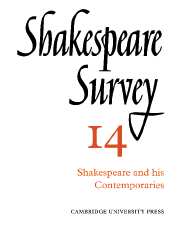Book contents
- Frontmatter
- Studies in Elizabethan and Jacobean Drama since 1900
- Shakespeare and Lyly
- Shakespeare and Mundy
- Marlowe as Provocative Agent in Shakespeare’s Early Plays
- The Tragedy of Revenge in Shakespeare and Webster
- The Simplicity of Thomas Heywood
- The Tragic Vision of Fulke Greville
- Shakespeare v. The Rest: The Old Controversy
- Shakespeare’s Gentleness
- Milton on Shakespeare
- An Unrecorded Elizabethan Performance of Titus Andronicus
- Stratford-upon-Avon a Hundred Years Ago
- International Notes
- Shakespeare Productions in the United Kingdom: 1959
- Three Directors: a Review of Recent Productions
- The Year's Contributions to Shakespearian Study 1 Critical Studies
- 2 Shakespeare’s Life, Times and Stage
- 3 Textual Studies
- Books Received
- Index
- Plate section
Marlowe as Provocative Agent in Shakespeare’s Early Plays
Published online by Cambridge University Press: 28 March 2007
- Frontmatter
- Studies in Elizabethan and Jacobean Drama since 1900
- Shakespeare and Lyly
- Shakespeare and Mundy
- Marlowe as Provocative Agent in Shakespeare’s Early Plays
- The Tragedy of Revenge in Shakespeare and Webster
- The Simplicity of Thomas Heywood
- The Tragic Vision of Fulke Greville
- Shakespeare v. The Rest: The Old Controversy
- Shakespeare’s Gentleness
- Milton on Shakespeare
- An Unrecorded Elizabethan Performance of Titus Andronicus
- Stratford-upon-Avon a Hundred Years Ago
- International Notes
- Shakespeare Productions in the United Kingdom: 1959
- Three Directors: a Review of Recent Productions
- The Year's Contributions to Shakespearian Study 1 Critical Studies
- 2 Shakespeare’s Life, Times and Stage
- 3 Textual Studies
- Books Received
- Index
- Plate section
Summary
There are a number of eruptions in Shakespeare’s work of passages which are unmistakably Marlovian in tone and attitude, to a degree which would almost justify a disintegrator in identifying them as Marlowe’s work. That can, of course, be said of Shakespeare’s relations with other contemporaries, for he was always a magpie; but what makes Marlowe’s influence quite a different matter from anyone else’s is that he alone was a poetic dramatist of genius. That the laments over the ‘dead’ Juliet might have been a different thing without Kyd, only suggests that they might have been a better thing; but that Morocco’s speeches in The Merchant of Venice would have been different without Tamburlaine leads forward into the evident development of Othello’s distinctive utterance from Morocco’s: and that is a line which can hardly be overvalued. It suggests a deliberate closeness to Marlowe’s very distinctive manner which must involve an attitude to his equally distinctive moral values, except for the most vulgarly eclectic of imitators; and Shakespeare was not that kind of magpie. The significance of such passages is my principal concern in this essay.
They form, of course, only a loosely distinguishable group among the various familiar kinds of Marlovian influence. At one extreme, there are precise verbal echoes which are often without particular significance; such things as
Peace !—how the moon sleeps with Endymion
(Merchant of Venice, v, i, 10whose evident derivation from Marlowe's Ovid (1, xiii, 43) only suggests to me how much more acceptable this side of The Merchant would be if Shakespeare had carried over Marlowe's irony with his imagery.
- Type
- Chapter
- Information
- Shakespeare Survey , pp. 34 - 44Publisher: Cambridge University PressPrint publication year: 1961
- 8
- Cited by

